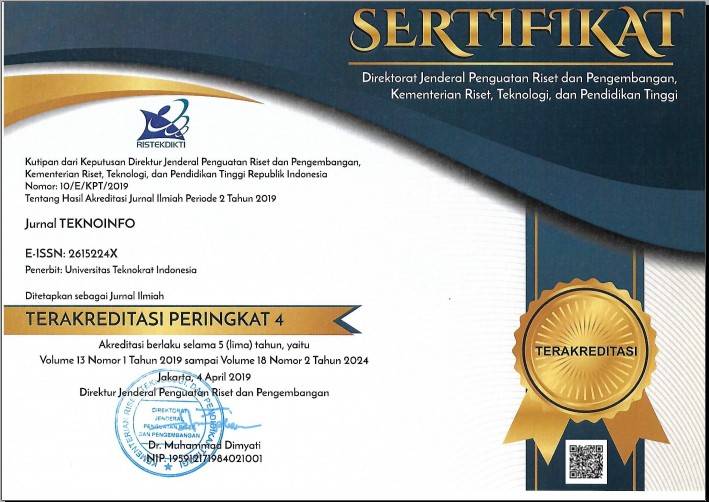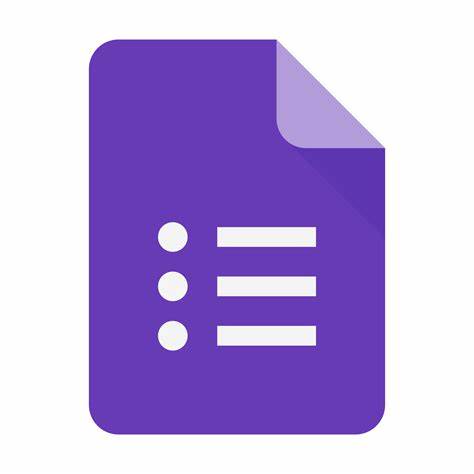EVALUATION OF DISTANCE LEARNING SYSTEM (E-LEARNING): A SYSTEMATIC LITERATURE REVIEW
Abstract
Research in the field of e-learning is currently experiencing rapid development, especially due to the covid 19 pandemic. The application of e-learning in the world of education is currently the main thing and requires evaluation of its use. This study aims to determine the evaluation of models and trends in the development of e-learning (Learning Management System). Applying the Kitchenham approach, this System Literature Review (SLR) uses three main databases including Science Direct, ACM, SCOPUS. The final result obtained 38 articles published between 2016 and 2021. From this SLR, it was found that there were 7 criteria, namely Platform, Evaluation Model, Evaluation, Model, Approach, Problem, Trend and Challenge. These 7 criteria can be used for further research on e-learning. Thus this research provides knowledge about criteria that can be used further in research on E-learning and provides insight into its state-of-the-art.
Full Text:
PDFReferences
R. R. Suryono, B. Purwandari, and I. Budi, “Peer to peer (P2P) lending problems and potential solutions: A systematic literature review,” Procedia Comput. Sci., vol. 161, pp. 204–214, 2019, doi: 10.1016/j.procs.2019.11.116.
J. Li, “Construction of modern educational technology MOOC platform based on courseware resource storage system,” Int. J. Emerg. Technol. Learn., vol. 12, no. 9, pp. 105–116, 2017, doi: 10.3991/ijet.v12.i09.7491.
J. C.-Y. Sun and K.-Y. Chang, “Design and development of a location-based mobile learning system to facilitate English learning,” Univers. Access Inf. Soc., vol. 15, no. 3, pp. 345–357, 2016, doi: 10.1007/s10209-014-0392-x.
D. Pal and V. Vanijja, “Perceived usability evaluation of Microsoft Teams as an online learning platform during COVID-19 using system usability scale and technology acceptance model in India,” Child. Youth Serv. Rev., vol. 119, p. 105535, 2020, doi: https://doi.org/10.1016/j.childyouth.2020.105535.
C. De Medio, C. Limongelli, F. Sciarrone, and M. Temperini, “MoodleREC: A recommendation system for creating courses using the moodle e-learning platform,” Comput. Human Behav., vol. 104, p. 106168, 2020, doi: https://doi.org/10.1016/j.chb.2019.106168.
A. Krouska, C. Troussas, and C. Sgouropoulou, “Usability and Educational Affordance of Web 2.0 Tools from Teachers’ Perspectives,” in 24th Pan-Hellenic Conference on Informatics, 2020, pp. 107–110, doi: 10.1145/3437120.3437286.
B. Song, Y. Sun, J. Guo, D. Zhao, and J. Tan, “Application of Case Teaching Method and Microteaching Method in Experimental Teaching Based on Wechat Platform,” in Proceedings of the 2021 International Conference on Bioinformatics and Intelligent Computing, 2021, pp. 407–411, doi: 10.1145/3448748.3448988.
C. Fan and J. Liu, “An Analysis of Russian Language and Culture Teaching under the Information Mobile Teaching Platform,” in 2021 2nd Asia-Pacific Conference on Image Processing, Electronics and Computers, 2021, pp. 352–355, doi: 10.1145/3452446.3452537.
Y. Liu, “Design and Application of Hybrid Teaching Platform Based on Internet +,” in 2021 2nd International Conference on Computers, Information Processing and Advanced Education, 2021, pp. 1490–1493, doi: 10.1145/3456887.3459706.
S. Li, Y. Yu, and S. Liu, “The Use of Online Teaching Platforms during CoVID-19 in China,” 2021, doi: 10.1145/3465631.3465869.
A. Rosetta, M. Agatha Priska, E. Muslim, and M. Rafi, “Evaluating the Success of E-Learning Systems and Strategy Creation: The Perspective of Students in Universitas Indonesia,” in 2020 The 4th International Conference on Education and E-Learning, 2020, pp. 11–17, doi: 10.1145/3439147.3439155.
M. K. Fadhilah, N. Surantha, and S. M. Isa, “Web-Based Evaluation System Using Kirkpatrick Model for High School Education (A Case Study for Vocational High School in Jakarta),” in Proceedings of 2018 International Conference on Information Management and Technology, ICIMTech 2018, 2018, pp. 166–171, doi: 10.1109/ICIMTech.2018.8528158.
N. Harrati, I. Bouchrika, A. Tari, and A. Ladjailia, “Exploring user satisfaction for e-learning systems via usage-based metrics and system usability scale analysis,” Comput. Human Behav., vol. 61, pp. 463–471, 2016, doi: https://doi.org/10.1016/j.chb.2016.03.051.
R. Scherer, F. Siddiq, and J. Tondeur, “The technology acceptance model (TAM): A meta-analytic structural equation modeling approach to explaining teachers’ adoption of digital technology in education,” Comput. Educ., vol. 128, pp. 13–35, 2019, doi: https://doi.org/10.1016/j.compedu.2018.09.009.
D. Aulia Winarno, E. Muslim, M. Rafi, and A. Rosetta, “Quality Function Deployment Approach to Optimize E-Learning Adoption among Lecturers in Universitas Indonesia,” in 2020 The 4th International Conference on Education and E-Learning, 2020, pp. 161–166, doi: 10.1145/3439147.3439157.
M. A. Safonov, S. S. Usov, and S. V. Arkhipov, “E-Learning Application Effectiveness in Higher Education. General Research Based on SWOT Analysis,” in 2021 5th International Conference on Education and Multimedia Technology, 2021, pp. 207–212, doi: 10.1145/3481056.3481096.
M. Agatha Priska, D. Aulia, E. Muslim, and L. Marcelina, “Developing a Framework to Evaluate E-Learning System at Higher Education in Indonesia,” in 2020 The 4th International Conference on Education and E-Learning, 2020, pp. 27–32, doi: 10.1145/3439147.3439154.
T. Crick, C. Knight, R. Watermeyer, and J. Goodall, “An Overview of the Impact of COVID-19 and ‘Emergency Remote Teaching’ on International CS Education Practitioners,” in Proceedings of the 52nd ACM Technical Symposium on Computer Science Education, 2021, p. 1288, doi: 10.1145/3408877.3439680.
Z. Li and Z. Zhan, “Integrated infrared imaging techniques and multi-model information via convolution neural network for learning engagement evaluation,” Infrared Phys. Technol., vol. 109, 2020, doi: 10.1016/j.infrared.2020.103430.
D. Eshun Yawson and F. Amofa Yamoah, “Gender variability in E-learning utility essentials: Evidence from a multi-generational higher education cohort,” Comput. Human Behav., vol. 114, p. 106558, 2021, doi: https://doi.org/10.1016/j.chb.2020.106558.
L. Marques, P. Matsubara, J. C. de Souza Filho, G. Gomes, B. Gadelha, and T. Conte, “Challenges and Learning from Remote Teaching of Usability and UX: An Experience Report,” 2020, doi: 10.1145/3439961.3440003.
C. Guo and Y. Liu, “BP Neural Network-Based Evaluation on University Teachers’ Teaching Quality,” in Proceedings of the 2020 3rd International Conference on E-Business, Information Management and Computer Science, 2020, pp. 285–289, doi: 10.1145/3453187.3453348.
H. K.Y. Ng, P. L.C. Lam, K. Chan, H. Leung, and S. Lai, “Flipping the Classroom: Will the Changes of Teachers Influence Learning Outcomes?,” in 2020 The 4th International Conference on Education and E-Learning, 2020, pp. 42–45, doi: 10.1145/3439147.3439156.
S. N. Kurbakova, Z. N. Volkova, and A. V Kurbakov, “Developing Students’ Cognitive Abilities in E-Learning Environment,” in 2021 12th International Conference on E-Education, E-Business, E-Management, and E-Learning, 2021, pp. 124–130, doi: 10.1145/3450148.3450180.
A. Shabunina, V. Shakhova, and L. Sorokina, “Emotional Resilience of Students in the Context of Distance Learning,” in 2021 5th International Conference on Education and Multimedia Technology, 2021, pp. 345–354, doi: 10.1145/3481056.3481090.
O. D. Shipunova, I. P. Berezovskaya, S. I. Kedich, N. V Popova, and N. Y. Kvashenko, “Intelligent Human Information Behavior in E-Learning System,” in 2021 2nd International Conference on Artificial Intelligence and Information Systems, New York, NY, USA: Association for Computing Machinery, 2021.
F. Giuseffi, “Renewing Self-Directed Learning in E-Learning Experiences,” ELearn, vol. 2021, no. 1, 2021, doi: 10.1145/3447871.3439736.
Y. Nakagawa, P. Sripian, and M. Sugaya, “Evaluation of Distance Learning on Concentration and Relax by EEG and HRV: Poster Abstract,” in Proceedings of the 18th Conference on Embedded Networked Sensor Systems, 2020, pp. 762–763, doi: 10.1145/3384419.3430602.
H. Deng, “Strategies to Improve the Online-Teaching Effect of Colleges and Universities in the Post-Epidemic Era,” in 2021 2nd International Conference on Computers, Information Processing and Advanced Education, 2021, pp. 786–789, doi: 10.1145/3456887.3457069.
A. Thi Van Pham and N. Thi Thao Ho, “The Implementation of E-Learning during the COVID-19 Pandemic in a Vocational Institution in Vietnam: An Investigation into Students’ Perceptions and Readiness,” in 2021 5th International Conference on Education and Multimedia Technology, 2021, pp. 234–239, doi: 10.1145/3481056.3481063.
G. E. Acuna, L. A. Alvarez, J. Miraflores, and M. J. Samonte, “Towards the Development of an Adaptive E-Learning System with Chatbot Using Personalized E-Learning Model,” in 2021 The 7th International Conference on Frontiers of Educational Technologies, 2021, pp. 120–125, doi: 10.1145/3473141.3473236.
X. Gui, Y. Li, and Y. Wu, “Teacher-Guardian Collaboration for Emergency Remote Learning in the COVID-19 Crisis,” Proc. ACM Hum.-Comput. Interact., vol. 5, no. CSCW2, 2021, doi: 10.1145/3479543.
T. Y. Huang and C. Huang, “Teaching and Learning through the Net,” in 2020 The 4th International Conference on Education and E-Learning, 2020, pp. 92–95, doi: 10.1145/3439147.3439182.
Y. Li, “Online Teaching of Higher Education in the Post-MOOC Era,” in 2021 2nd International Conference on Computers, Information Processing and Advanced Education, 2021, pp. 198–201, doi: 10.1145/3456887.3456931.
D. Wang, “Novel Coronavirus Online Teaching in College During the Epidemic Period,” in 2021 2nd International Conference on Computers, Information Processing and Advanced Education, 2021, pp. 108–112, doi: 10.1145/3456887.3456910.
O. Bardales Mendoza, T. Fernandez Bringas, and L. Saavedra Bendezú, “Perspectives of the Use of ICT for the Teaching-Learning Process among Peruvian University Students and Lecturers during the COVID-19 Pandemic,” in 2020 2nd International Workshop on Artificial Intelligence and Education, 2020, pp. 49–53, doi: 10.1145/3447490.3447500.
C. Othman Abdullah and R. Mahmood Abdulla, “Evaluation of E-Learning in Higher Education during COVID-19 Pandemic: A Case Study in University of Sulaimani,” in 2021 12th International Conference on E-Education, E-Business, E-Management, and E-Learning, 2021, pp. 68–74, doi: 10.1145/3450148.3450176.
T. Ivanova, V. Terzieva, and M. Ivanova, “Intelligent Technologies in E-Learning: Personalization and Interoperability,” in International Conference on Computer Systems and Technologies ’21, 2021, pp. 176–181, doi: 10.1145/3472410.3472427.
Chaudhry, Ifat Sabir., Paquibut, Rene., Islam, Abu Reza., Chabchoub, Habib. Testing the success of real time online delivery channel adopted by higher education institutions in the United Arab Emirates during the Covid 19 pandemic. International Journal of Educational Technology in Higher Education. 2021.
Tautz D.,Sprenger D.A.,Schwaninger A.. Evaluation of four digital tools and their perceived impact on active learning, repetition and feedback in a large university class. Computers and Education. 2021
Prasetyo, Yogi Tri., Ong, Ardvin Kester S., Krissianne Giero., Concepcion, Frances., Navata, Francheska Mikaela B. Determining Factors Affecting Acceptance of E-Learning Platforms during the COVID-19 Pandemic: Integrating Extended Technology Acceptance Model and DeLone & McLean IS Success Model, Sustainability. 2021.
Kitchenham, Barbara, O. Pearl Brereton, David Budgen, Mark Turner and Mohamed Khalil. “Lesson From Applying The Systematic Literature Review Process Within The Software Engineering Domain”. J Syst Softw 80 : 571 -58, 2007
DOI: https://doi.org/10.33365/jti.v16i1.1736
Refbacks
- There are currently no refbacks.
Copyright (c) 2022 Ignatius Adrian Mastan, Dana Indra Sensuse, Ryan Randy Suryono, Kautsarina Kautsarina

This work is licensed under a Creative Commons Attribution-ShareAlike 4.0 International License.
JURNAL TEKNOINFO
Published by Universitas Teknokrat Indonesia
Organized by Prodi S1 Informatika FTIK Universitas Teknokrat Indonesia
W: http://ejurnal.teknokrat.ac.id/index.php/teknoinfo/index
E : teknoinfo@teknokrat.ac.id.
Jl. Zainal Abidin Pagaralam, No.9-11, Labuhan Ratu, Bandarlampung

This work is licensed under a Creative Commons Attribution-ShareAlike 4.0 International License.
Jumlah Pengunjung : View Teknoinfo StatsCounter



















